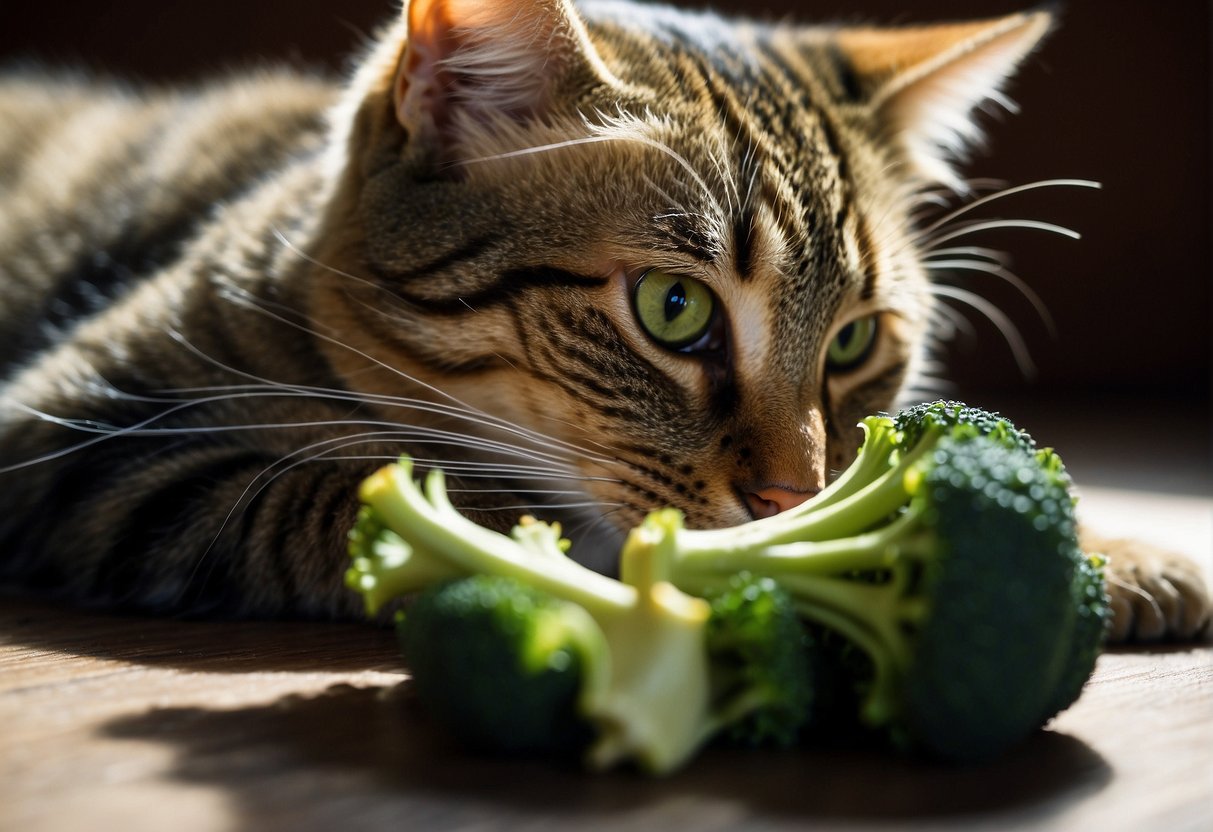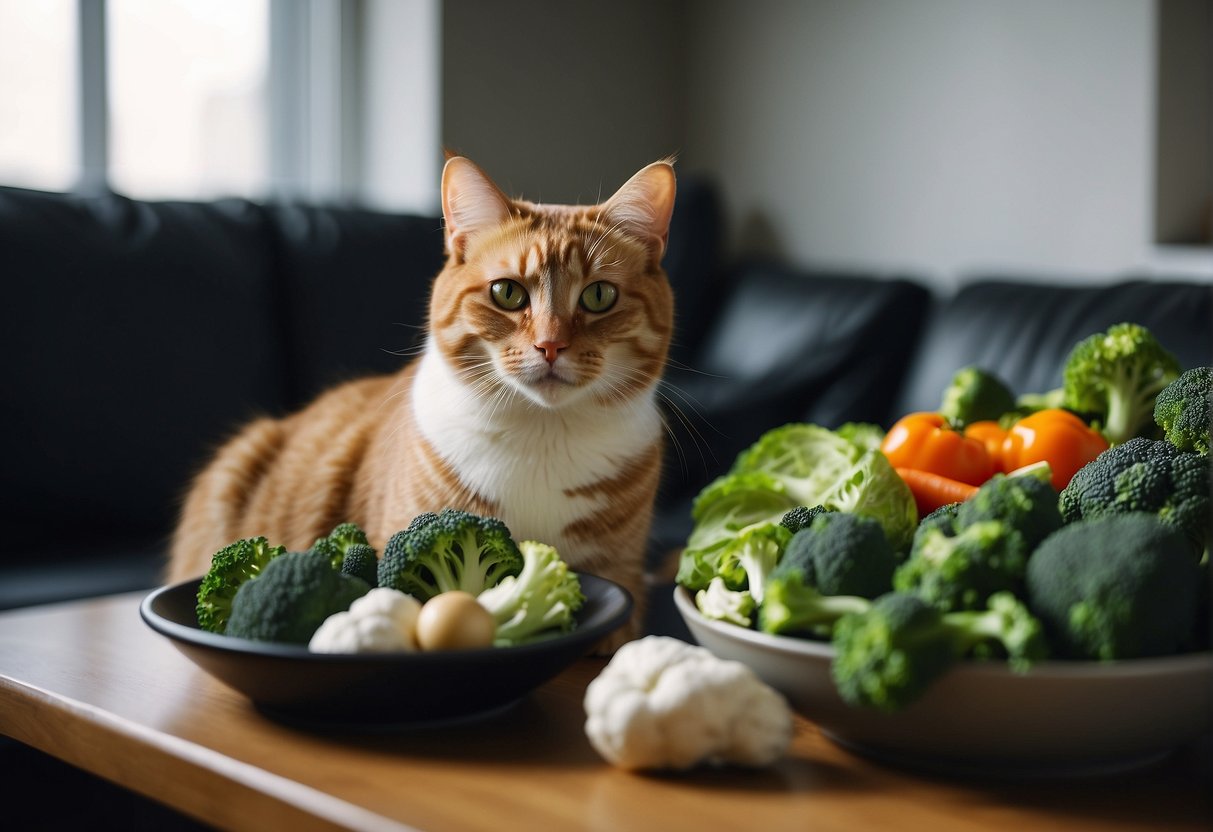You might be surprised to know that your cat can actually have broccoli.
That’s right, this green veggie, known for its dense nutritional benefits in humans, isn’t off-limits to your feline friend.
However, moderation is key, as cats have different dietary requirements than we do.
Additionally, there are other cat-safe vegetables, such as asparagus, carrots, spinach, some types of squash like zucchini, green bell peppers, corn, cucumbers (though make sure you cut it up thoroughly before serving, as some cats are afraid of cucumbers!), and only vegetable, that provide some kind of additional benefit.

Cats are obligate carnivores by nature, which means that their bodies are designed to thrive primarily on meat. (1)
The essential nutrients they need, like taurine, arachidonic acid, and vitamin A, are found abundantly in animal-based proteins.
Vegetables can play a role in a cat’s diet, but it’s important to keep in mind that they plant protein can’t replace animal proteins which are crucial for a cat’s overall health and well-being.
Despite some common misconceptions, cats can’t survive on plant-based diets—incorporating veggies like broccoli should be done with careful consideration and ideally, under the guidance of a vet.
A little bit of broccoli can add some beneficial fiber and variety to your cat’s diet, but it should never overshadow the meat protein that must make up the majority of their caloric intake to avoid deficiencies.
Besides enjoying broccoli, it’s crucial for cat owners to always avoid toxic ingredients that could harm their pets, including onions, garlic, and chocolate, to ensure their diet remains safe and healthy.
Key Takeaways
- Cats can safely eat broccoli in moderation, and remember cats need meat-based nutrition.
- Meat should be the primary component of a cat’s diet since cats are obligate carnivores.
- Including vegetables like broccoli should be carefully balanced to avoid nutritional deficiencies.
Can Cats Eat Broccoli?
Nutritional Benefits of Broccoli for Cats
Have you ever wondered if your furry companion can share in your love for broccoli?
The answer might surprise you. Turns out, broccoli’s nutrient profile can be pretty pawsome for cats. It serves up a healthy dose of:
- Vitamin K: For strong bones. (2)
- Vitamin C: An antioxidant boost, though cats produce it naturally. (3)
- Fiber: This aids in digestion and helps with hairball management. (4)
Just think of broccoli as a mini tree packed with goodies for your kitty’s health.
But remember, too much of a good thing can have its drawbacks, which brings us to some words of caution.
Potential Risks and Precautions
While broccoli can be a great snack, moderation is key. Think of it as an occasional treat rather than a meal replacement.
Keep it to a small portion, no more than a few small florets.
As for frequency, it’s a good idea to stick to a couple of times a week at most to help prevent the production of free radicals.
Curious about how to prep it? The safest ways are:
- Steamed: Softens the florets while retaining nutrients.
- Raw: Crunchy and appealing, but only in tiny amounts.
Avoid any seasonings or oils – simplicity is the spice of your kitty’s life here.
So, you’ve got the scoop on the green stuff. A nibble here, a floret there, and you can ensure your cat enjoys the benefits of broccoli safely and happily.
Just like your own meals, it’s all about a balance. Happy feeding!
In-Depth Veterinary Insights and Nutritional Analysis
Expert Opinions on Broccoli in Cat Diets
Dr. Whiskerpaws, a seasoned vet, surely knows the scoop: “While broccoli isn’t a traditional cat food, it’s safe and can be beneficial in moderation,” she explicates.
Broccoli is replete with fiber for better digestion, high in vitamins like K and C, and a great non-meat source of antioxidants that can help with regular bowel movements.
As an added bonus, the bright green florets might even satisfy your kitty’s plant chomping urges, offering a reprieve to your houseplants!
Nutritionally, broccoli packs a punch for your kitty:
- Fiber: Aids digestion
- Antioxidants: Protect cells from damage
- Folic Acid: Essential for DNA synthesis (5)
- Potassium: Regulates fluid balance (6)
Scientific Studies and Evidence
Research suggests broccoli has a place in a cat’s snack rotation. One study highlights how antioxidants in greens can reduce oxidative stress in pets.
Picture this: antioxidants swooping in like superheroes, battling cell villains!
However, remember — moderation is key. Broccoli should only be an occasional treat, not a meal replacement. Introduce it slowly to see how your furry friend reacts.
Isn’t it interesting how our kitties can share some of our favorite superfoods?
Whether you’re sprinkling a few florets in their bowl or using it as a healthy treat, rest assured that broccoli and brown rice, are nutritious additions.
Just keep an eye on the portions and make sure they’re cooked and unseasoned for their dining pleasure!
One caveat, though, make sure to check with your vet. Every cat has their unique dietary needs after all!
Alternatives to Broccoli in a Cat’s Diet

Safe Vegetables and Fruits for Cats
Wondering what else can play the role of broccoli in your kitty’s diet? There’s a bunch of safe options out there! Check out this quick list of alternatives:
- Carrots: Steam them up for a beta-carotene boost.
- Green beans: Crunchy, and full of fiber.
- Spinach: Only if your cat doesn’t have a history of urinary or kidney problems.
- Zucchini: A good source of vitamins and minerals.
- Blueberries: Antioxidant-rich, in moderation.
- Melon: A hydrating treat. Just remove the seeds!
- Apples: Peeled and seedless as a sweet snack.
While these aren’t exactly broccoli’s twins, they do offer their nutritional value. They can be a good source of vitamins, fiber, and cantaloupe, which contribute to your cat’s overall health.
Even a small amount of these fruits and veggies, including cantaloupe, can be beneficial, but always in moderation and after consulting your vet.
Foods to Avoid in a Cat’s Diet
Now, let’s talk about what’s not on the cat menu. Here’s a no-fly list:
- Chocolate: It’s a sweet sin they must never indulge in!
- Onions and garlic: Keep these away; they can cause anemia.
- Grapes and raisins: No matter how healthy for us, they’re toxic for cats.
- Avocado: A no-go due to a substance called persin.
- Alcohol: Even a small amount can be dangerous.
Quite a few stories are floating around about cats getting into things they shouldn’t. For instance, incidences of cats experiencing kidney failure after munching on grapes are well-documented.
Always err on the side of caution and keep these forbidden snacks out of paw’s reach.
Remember, the right treat in the right amount can make all the difference.
So, give these safe veggies and fruits a go next time you feel like spicing up your furry friend’s diet—but keep it to nibble size, okay?
Quick Recap

Summary of Key Points
Here’s what you should know:
- Broccoli is safe: It’s a non-toxic veggie for cats.
- Cook it properly: Always serve it well-cooked and unseasoned.
- Moderation is key: It’s fine as an occasional treat, not as a regular meal.
- Health benefits: Contains fiber for digestion and is packed with antioxidants.
Wondering about portions? Just keep it small and supplementary.
Encouraging Responsible Pet Ownership
Remember, your cat’s diet should be primarily high-quality cat food that’s rich in protein. Think of broccoli as a tiny bonus, not a staple.
If you’re considering new foods for your buddy, it’s always wise to have a chat with your vet first.
After all, you want to ensure that every nibble contributes to a happy, healthy life for your whiskered companion.
Have you noticed how cats sometimes munch on houseplants?
A bite of broccoli or chives, safe options of human food, might satisfy their craving for greens without any worry.
Frequently Asked Questions
When it comes to your furry friend’s diet, you may wonder if it’s okay to share some of your greens with them.
Here are the nitty-gritty details that answer your top questions about cats and broccoli.
Is Broccoli Safe for Cats to Eat?
Yes, broccoli is safe for cats to eat. It’s a non-toxic vegetable that can offer some health benefits when consumed in moderation.
What Nutrients Does Broccoli Provide for Cats?
Broccoli is a great source of fiber, which supports your cat’s digestive system.
Additionally, it contains vitamin C, vitamin K, and various minerals beneficial for overall health.
How Much Broccoli Can a Cat Eat Safely?
Broccoli should only be a supplemental treat, not a main part of a cat’s diet.
A small, bite-sized amount occasionally is sufficient for your cat to enjoy the benefits without any issues.
Are There Any Risks Associated with Feeding Broccoli to Cats?
While broccoli isn’t toxic, too much could cause stomach upset or gas.
Introduce broccoli slowly to your cat’s diet to ensure it doesn’t lead to digestive issues.
How Should Broccoli Be Prepared for Cats?
Cats might prefer cooked broccoli, as it’s easier to chew and digest.
Always serve it plain, without any added oils, seasonings, or spices that could harm your cat.
Can Kittens Eat Broccoli?
Kittens can eat broccoli, but their diets are especially delicate.
It’s crucial to limit their intake to very small amounts and only occasionally, after they have been weaned and are eating solid food.
Are There Better Vegetable Alternatives to Broccoli for Cats?
While broccoli is safe for cats, other vegetables like baked carrots or steamed green beans might be more appealing to your cat.
Variety can help ensure they get a range of nutrients.
- The Ultimate Overview to Casino Site Gamings Online - July 26, 2025
- How to Get the Most Out of Online Casino No Deposit Bonuses - July 26, 2025
- Online Gambling Establishments Accepting Paypal: A Comprehensive Overview for Gamblers - July 26, 2025

